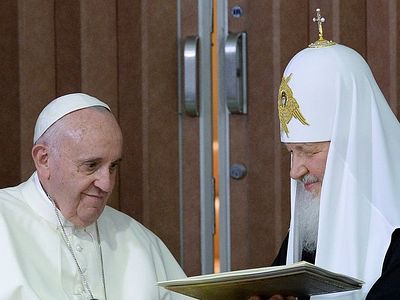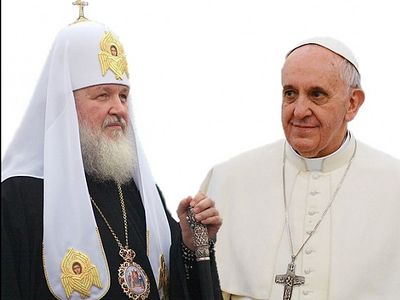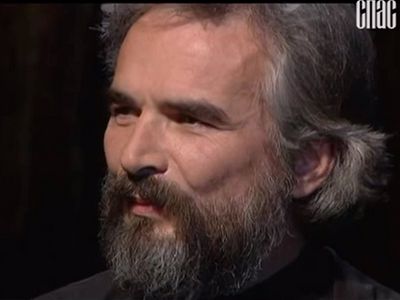Source: Facebook
February 14, 2016
As is well known, on Saturday February 13, 2016, His Holiness Patriarch Kirill met with Pope Francis in the Havana aiport in Cuba, the first such meeting between a Russian patriarch and Catholic pope in history. In the long-awaited meeting the primates discussed a number of issues facing Christians in the world today, and what role their respective Churches could play in regards to these issues. The joint declaration signed by both primates highlights important topics such as persecution and discrimination against Christians throughout the world, poverty, reverence for life and the family, and the ecclesiastical situation in Ukraine, among other issues. While the declaration focuses on Christian unity, it has in fact, sparked debate on both sides, and several voices have already offered their comments. Among those is Fr. George Maximov, a dynamic and tireless missionary priest who has served in mission fields throughout the world, who offered on his personal Facebook page a balanced appraisal of the declaration, highlighting both its strenghts and weaknesses:
To begin with, let me remind those who, already by the mere fact of the meeting, are lamenting: “all is lost, all is lost”: nothing is lost. The canons forbid us to serve with heretics, to pray with them, and to take their blessing. Simply to meet, the canons do not forbid. The patriarch has not become a Catholic by this meeting.
On the meeting
Inasmuch as our patriarch was sent to this meeting neither by the Synod, nor by the Council of Primates (as far as I know), it is, in fact, his personal meeting.
It is good that the meeting passed without any kind of joint liturgical services or prayers. One gets the impression that the pope received the patriarch as an equal—nowhere in any of the photos do we see that the patriarch would have agreed to any subordination in relation to the Pope’s position.
On the document
On one hand, there are in the document not a few words with which we can agree. For example, the words in defense of the persecuted and oppressed in the Middle East (§8-10), the criticism of Islam (§13), the words against the discrimination of Christians in the West (§15), the call for rich countries to share with the poor (§17), the condemnation of homosexual indoctrination (§20), and abortion (§21), and that the schisms in Ukraine should be resolved “on the basis of canonical norms” (§27).
But for all of these, there are also expressions which are by no means indisputable, and sometimes erroneous.
For example: “it is our hope that our meeting may contribute to the re–establishment of this unity willed by God, for which Christ prayed … [and] inspire Christians throughout the world to pray to the Lord … for the full unity of all His disciples (§9). In the Church of Christ unity is already achieved in its fullness. Therefore in the Creed we confess faith in “one Church.” It is another matter that from this unity with the Church departed various heretical and schismatic communities. But their members cannot be called disciples of Christ. They are disciples of those who teach perversely about Christ and led them out of unity with the Church.
“We bow before the martyrdom of those who, at the cost of their own lives, have given witness to the truth of the Gospel, preferring death to the denial of Christ. We believe that these martyrs of our times, who belong to various Churches but who are united by their shared suffering, are a pledge of the unity of Christians” (§12). They would be able to be the pledge of unity of Christians only were we to proclaim that all the dogmatic differences in the faiths of the churches to which belonged those who were killed were wholly irrelevant. But to do so, we are unable. In actuality, only unity in truth can be the pledge of unity of Christians, which is not achieved by the suppression of dogmatic divergences, but in investigating them and rejecting those dogmas which are fallacious, for the sake of those which are true.
Cause for concern is the statement that mission work “excludes any form of proselytism” (§24). It is not clear what is meant. For example, within the concept of missionary work there is the definition of proselytism as the carrying out of missionary work by improper means (coercion, bribery, deception). In this sense, we can agree. But I believe that in this document, particularly concerning the phrase “any form,” can be understood that, generally, it is forbidden to guide Catholics into Orthodoxy, which, naturally, is absurd. And the same in the following paragraph: “the method of ‘uniatism’ of past centuries, involving leading one community into unity with another by way of separation from its own Church, is not the way to restore unity” (§25). But if we could guide some community of the Catholic Church into Orthodoxy, it would be for that given community the reestablishment of unity with the Church of Christ, and if it doesn’t happen, then that community remains in a state of separation from the Church.
“Thus, in large part, the future of humanity depends upon whether we will be able in this critical period to bear witness together to the Spirit of truth” (§28). In order for us, together with the Roman Church, to “bear witness together to the Spirit of truth” it is necessary for it to confess the truth and abandon its false dogmas.





